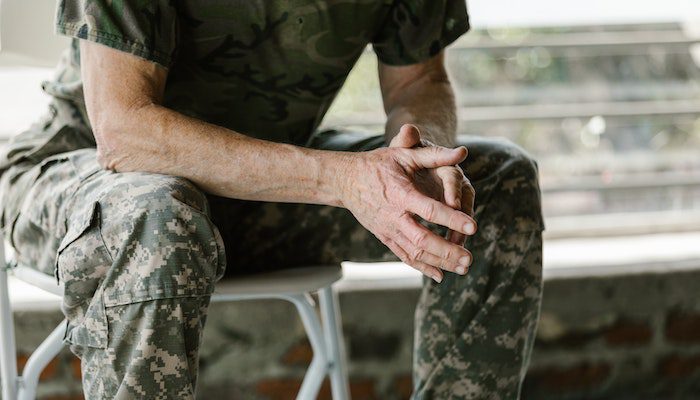Veterans are at high risk for developing substance use disorder (SUD), more commonly recognized as an addiction. Many also have co-occurring disorders, such as post-traumatic stress disorder (PTSD) and depression. If your loved veteran served overseas or spent a significant amount of time away from home serving in the military, you may be worried about their substance use. How do you know if they’re drinking too much or have developed a dependence on opioids?
Those questions are difficult to answer, and symptoms vary from one person to the next. Because Veterans are at a higher risk for addictions, it’s critical that family members keep a close eye on their behaviors so that they can get help if needed.
If a doctor diagnosed PTSD in your loved one, they have a significantly higher risk of suffering from addiction. The U.S. Department of Veterans Affairs states that 2 of every 10 Veterans with PTSD also have an SUD.
Signs of Addiction in Veterans
Substance use disorder can occur slowly over time, though some people will see it develop at a faster rate than others. These are some of the most common signs and symptoms of SUD in Veterans.
- Urges to drink: Some people with SUD say they have urges or intense cravings to use the substance. For example, they may have a constant need to have a drink. This is often difficult to avoid.
- Inability to stop: A person may want to stop using drugs or alcohol, but they cannot seem to do so. They have an inability to control how much they use as well. Though they may promise to have just one drink, they rarely can stick to that goal.
- Reckless living: A person with addiction and dependence is likely to engage in high-risk activities. That may include drinking and driving, unprotected sexual encounters, or theft.
- Relationship changes: Many family members notice this and take it personally. Those with addiction may pull away from family and friends. They may even find themselves struggling with relationships that you know are important to them, such as those with their children or close friends.
- Inability to maintain responsibilities: This includes responsibilities at home, work, or school. Your loved one makes promises, but doesn’t keep them. They may struggle to maintain a job or may no longer do as well at their job.
- Using more of the substance: Look for increasing amounts of substance being used over time. This indicates tolerance. To continue to feel the benefits of the substance, a person needs to use more of it.
Know the Signs of PTSD
Often, Veterans struggle with mental health disorders and then use substances to help them control the symptoms they have. One of the most important signs to look for in your loved one is the presence of PTSD or other mental health challenges, which may be indicated by:
- Re-Experiencing Symptoms:
- Intrusive memories or flashbacks of the traumatic event.
- Nightmares related to the traumatic experience.
- Distressing and uncontrollable thoughts about the trauma.
- Emotional or physical reactions to reminders of the trauma.
- Avoidance Symptoms:
- Avoiding situations, places, people, or activities that trigger memories of the traumatic event.
- Efforts to avoid thoughts or conversations related to the trauma.
- Loss of interest in previously enjoyable activities.
- Feeling emotionally numb or detached from others.
- Negative Alterations in Mood and Cognition:
- Persistent negative beliefs about oneself, others, or the world.
- Distorted sense of blame or guilt.
- Difficulty remembering important aspects of the traumatic event.
- Negative emotional state, such as persistent anger, guilt, shame, or fear.
- Feeling emotionally detached or unable to experience positive emotions.
- Hyperarousal Symptoms:
- Hypervigilance or an exaggerated startle response.
- Irritability, anger outbursts, or aggressive behavior.
- Difficulty concentrating or focusing.
- Difficulty falling asleep or staying asleep.
- A sense of constant alertness or being “on edge.”
- Changes in Behavior and Relationships:
- Social withdrawal or isolation.
- Avoiding crowds or public spaces.
- Relationship difficulties or increased conflicts with family and friends.
- Feelings of alienation or disconnect from others.
- Changes in behavior, such as reckless or self-destructive actions.
- Physical Symptoms:
- Physical symptoms such as headaches, stomachaches, or other unexplained pains.
- Increased heart rate or rapid breathing in response to triggers.
What to Do If You See These Signs of Addiction in Veterans
If you recognize any symptoms of SUD in a loved veteran, do not wait to get them help. Recognize that it may not be easy to get them into treatment. Discuss what you’ve experienced with your loved one, such as changes in their health, behavior, work activities, or substance use habits. Use specific facts to describe how their behavior has impacted you or your family. Ask them to enter into a treatment program.
Both inpatient and outpatient addiction treatment programs are available for Veterans. These programs may include medical and mental health treatment, specialized therapy to help them with their specific areas of concern, and support group therapy.
The Tactical Recovery Program at The Ranch at Dove Tree provides a highly specialized treatment program for Veterans. It is a certified program that helps with the treatment of SUDs but also with stress, depression, PTSD, and living life in the complicated world of daily life after time spent in the military. This program also provides trauma support for those who are struggling with past traumatic events.
These programs are the foundation of saving your loved one’s life. With them, you can provide your loved one with exceptional support and all of the tools they need to recover. More so, they will need your support, which may mean helping them to get to appointments and enabling them to live in a drug-free, supportive environment.
If you’re struggling as a Veteran or someone who loves a Veteran, reach out to our team in Lubbock, Texas, today to learn more about our treatment programs.













